Recently I needed to automate Natural Docs install through Ketarin. I could assume it was installed into default path (%ProgramFiles(x86)%\Natural Docs), but I decided to take a safe approach. Sadly, even if the installer created a key on HKLM\Software\Wow6432Node\Microsoft\Windows\CurrentVersion\Uninstall, none of it's value lead me to find the install dir.
The Stein answer suggests AppSearch MSI function, and it looks interesting, but sadly Natural Docs MSI installer doesn't provide a Signature table to his approach works.
So I decided to search through registry to find any reference to Natural Docs install dir, and I find one into HKLM\SOFTWARE\Microsoft\Windows\CurrentVersion\Installer\UserData\S-1-5-18\Components key.

I developed a Reg Class in C# for Ketarin that allows recursion. So I look all values through HKLM\SOFTWARE\Microsoft\Windows\CurrentVersion\Installer\UserData\S-1-5-18\Components and if the Main application executable (NaturalDocs.exe) is found into one of subkeys values, it's extracted (C:\Program Files (x86)\Natural Docs\NaturalDocs.exe becomes C:\Program Files (x86)\Natural Docs) and it's added to the system environment variable %PATH% (So I can call "NaturalDocs.exe" directly instead of using full path).
The Registry "class" (functions, actually) can be found on GitHub (RegClassCS).
System.Diagnostics.ProcessStartInfo startInfo = new System.Diagnostics.ProcessStartInfo("NaturalDocs.exe", "-h");
startInfo.UseShellExecute = false;
startInfo.CreateNoWindow = true;
var process = System.Diagnostics.Process.Start (startInfo);
process.WaitForExit();
if (process.ExitCode != 0)
{
string Components = @"SOFTWARE\Microsoft\Windows\CurrentVersion\Installer\UserData\S-1-5-18\Components";
bool breakFlag = false;
string hKeyName = "HKEY_LOCAL_MACHINE";
if (Environment.Is64BitOperatingSystem)
{
hKeyName = "HKEY_LOCAL_MACHINE64";
}
string[] subKeyNames = RegGetSubKeyNames(hKeyName, Components);
// Array.Reverse(subKeyNames);
for(int i = 0; i <= subKeyNames.Length - 1; i++)
{
string[] valueNames = RegGetValueNames(hKeyName, subKeyNames[i]);
foreach(string valueName in valueNames)
{
string valueKind = RegGetValueKind(hKeyName, subKeyNames[i], valueName);
switch(valueKind)
{
case "REG_SZ":
// case "REG_EXPAND_SZ":
// case "REG_BINARY":
string valueSZ = (RegGetValue(hKeyName, subKeyNames[i], valueName) as String);
if (valueSZ.IndexOf("NaturalDocs.exe") != -1)
{
startInfo = new System.Diagnostics.ProcessStartInfo("setx", "path \"%path%;" + System.IO.Path.GetDirectoryName(valueSZ) + "\" /M");
startInfo.Verb = "runas";
process = System.Diagnostics.Process.Start (startInfo);
process.WaitForExit();
if (process.ExitCode != 0)
{
Abort("SETX failed.");
}
breakFlag = true;
}
break;
/*
case "REG_MULTI_SZ":
string[] valueMultiSZ = (string[])RegGetValue("HKEY_CURRENT_USER", subKeyNames[i], valueKind);
for(int k = 0; k <= valueMultiSZ.Length - 1; k++)
{
Ketarin.Forms.LogDialog.Log("valueMultiSZ[" + k + "] = " + valueMultiSZ[k]);
}
break;
*/
default:
break;
}
if (breakFlag)
{
break;
}
}
if (breakFlag)
{
break;
}
}
}
Even if you don't use Ketarin, you can easily paste the function and build it through Visual Studio or CSC.
A more general approach can be taken using RegClassVBS that allow registry key recursion and doesn't depend on .NET Framework platform or build processes.
Please note that the process of enumerating the Components Key can be CPU intense. The example above has a Length parameter, that you can use to show some progress to the user (maybe something like "i from (subKeysName.Length - 1) keys remaining" - be creative). A similar approach can be taken in RegClassVBS.
Both classes (RegClassCS and RegClassVBS) have documentation and examples that can guide you, and you can use it in any software and contribute to the development of them making a commit on the git repo, and (of course) opening a issue on it's github pages if you find any problem that you couldn't resolve yourself so we can try to reproduce the issue to figure out what we can do about it. =)
